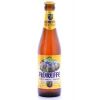Brasserie Lefèbvre - Floreffe Triple
-
ABV:
~8% -
Serving Temperature:
47-52° F -
Suggested Glassware:
Tulip, Snifter, Goblet
The Belgian Tripel style (alternatively spelled ‘triple’ or sometimes ‘trippel’) is so named because these beers are brewed with significantly more malt than an abbey brewery’s more simple offerings. This version is brewed to an old recipe created by the monks of the Abbaye de Floreffe and pours a beautiful golden-coppery color with a voluminous, pillowy head; retention is excellent. Notice a slight haze, which is expected in bottle-conditioned beers like this which referment in the bottle. On the nose, Belgian yeast offers its distinctive, dusty earthiness. Fruity aromas abound, with impressions of apple, peach, and pear, with berry-like undertones. There’s also a promise of sweetness, which ends up manifesting quite robustly on the palate. The fruity notes hit the palate upfront as the sweetness expands amid pale malts with a hint of caramel. Cane sugar is added to lighten the body of this big brew, as is typical for the style (the yeast convert the sugar to alcohol, which is thinner than water and lightens the feel of this otherwise very malty beer). Some light phenolic (medicinal) notes are also apparent, plus an interesting spiciness that appears on the mid-palate along with mild bitterness and alcohol, providing a good balancing bite. The finish is drier, lightly tart, and with a lingering note of grain. Pair with a sharp blue cheese like Stilton, or strong, firm cheeses like Comté. Poultry and salmon make excellent accompaniments, as well.
Quenast, Belgium has long been a town where great thirsts beg to be quenched. In 1876, Jules Lefèbvre, a local farmer, gamekeeper, and innkeeper, decided to finally bring this stone quarry town its own brewery. Since that time, the brewery has been in a state of almost continuous operation, and has remained a family-owned and family-run artisanal business through six generations of Lefèbvre brewers. The only pause in operation was in World War I, when the Germans ordered the brewery dismantled in order to harvest its metals and equipment. But in 1921, after the war had ended, Jules’s son Auguste Lefèbvre re-established the brewery in a new location when he took over a bankrupt brewery. The Lefèbvre Brewery remains in operation at this site to this very day.
Gaston Lefèbvre, the third generation of brewers, continued where Auguste left off by making significant strides toward modernizing the brewery to allow higher production quality, consistency, and an increase in volume. Despite the modernization of certain parts of the brewing process, the beer continued to be brewed in a coal-fired kettle that harnessed the natural wind currents from the valley below the brewery to manage the intensity of the flames (this traditional fire-fed brew kettle remains in use today). As with so many other breweries across Europe, Lefèbvre saw its operations threatened by World War II. Thankfully the brewery was not destroyed, although production was limited to only 0.8% ABV beer until the end of the war in 1945.
From 1960 to 1975, the fourth generation Lefèbvre brewer, Pierre, took over control of the operations, after which his son Philippe took up the mantle. In 1983, the Abbaye de Floreffe (Floreffe Abbey) allowed the Lefèbvre family to begin brewing their traditional, special-recipe, abbey beers (one of which we are thrilled to bring you this month!). Paul Lefèbvre joined the brewing team in 2002, and under his guidance this family-run business produces a wide array of artisanal beers, from hand-crafted witbiers, to abbey ales, to honey lagers, to a variety of traditional fruit beers such as framboise (raspberry), pèche (peach), and kriek (cherry). Not only are their fantastic beers quite refreshing, we feel their family-run business model is equally so! For more information about the brewery, check out their website at www.BrasserieLefebvre.be.

Unmatched Variety by style, brewery & country
Choose from Five different Beer Clubs offering unmatched variety by brewery,
country of origin, and beer style to suit your specific tastes.


